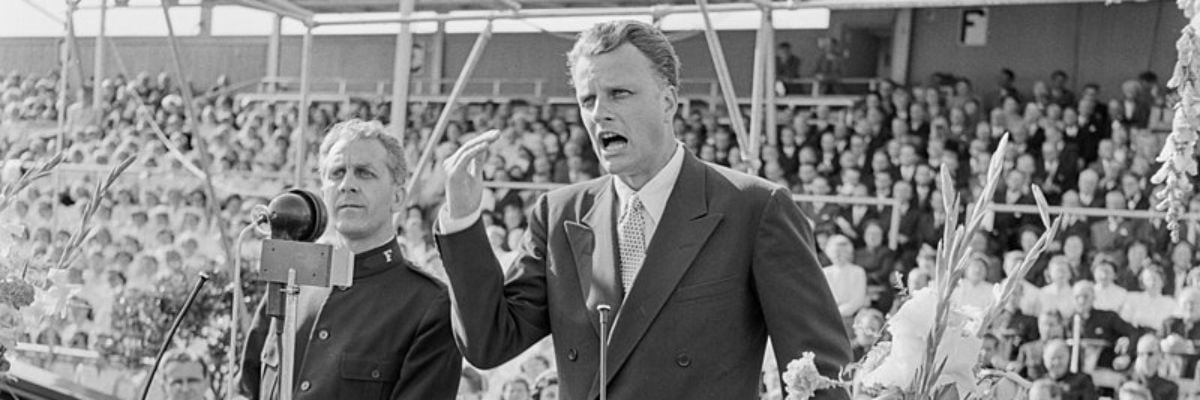
Question:
Answer:
Not really.
While Billy Graham and Catholics share common ground in the basic tenets of Christian beliefs (e.g., belief in one God, the Trinity, etc.), there remains a wide chasm on the issues of how one becomes a Christian and assurance of salvation.
Remember, we must admit that we are sinners. We must turn away from our sins and to Christ. We must trust Him as our Savior and follow Him as our Lord. God promises that when we do this, He will save us and make us His children, and we will live with Him forever.
Another of the many reasons believers can feel eternally secure in their relationship with God has to do with the steadfast love of God for His Son, Jesus. . . . God does not, cannot and never will condemn Jesus, “There is therefore now no condemnation for those who are in Christ Jesus” (Rom. 8:1). To reject a believer in Christ, God would have to cast Jesus Himself out of heaven.
The Catechism of the Catholic Church on the necessity of baptism for salvation:
. . . “the washing of regeneration and renewal by the Holy Spirit,” for it signifies and actually brings about the birth of water and the Spirit without which no one “can enter the kingdom of God” (Titus 3:5, John 3:5) (CCC 1215).
. . . Justified by faith in baptism, [they] are incorporated into Christ; they therefore have a right to be called Christians…(1271).
The Catechism on eternal security:
Mortal sin is a radical possibility of human freedom, as is love itself. It results in the loss of charity and the privation of sanctifying grace, that is, of the state of grace. If it is not redeemed by repentance and God’s forgiveness, it causes exclusion from Christ’s kingdom and the eternal death of hell, for our freedom has the power to make choices for ever, with no turning back. However, although we can judge that an act is in itself a grave offense, we must entrust judgment of persons to the justice and mercy of God (1861).
For further reading, see our tract “Assurance of Salvation?”
The idea that you receive salvation and eternal security by simply “accepting Jesus Christ as your Lord and Savior” is contrary to Catholic teaching, not to mention unbiblical. Yet this is the core message at the Billy Graham Festivals. It should interest Catholics to know that, according to the Billy Graham Evangelistic Association, prospective counselors are required to fill out an application that asks questions like:
- What is our basic spiritual problem? Why do we need salvation?
- What was God’s remedy for our problem? What did Jesus Christ do for sinners?
- How much we respond? How does a person become a Christian—a child of God?
- Briefly state HOW and WHEN you personally accepted Jesus Christ as your Lord and Savior?
If the application is approved, the prospective counselor will receive extensive training on how to present this message of salvation to individuals coming forward at the Festival’s “altar call.”
Before a Catholic fills out the application to serve as a festival counselor, I suggest the following questions be considered and answered:
- Can I answer the questions listed above honestly without compromising the Catholic Faith (using the Catechism as a reference)?
- Can I sign the application in agreement with their beliefs?
- Do the steps in their booklet Peace With God comply with Catholic teaching on justification?
- Why would I want to communicate a message of salvation that runs contrary to the fundamental teachings of the Faith?
As the Congregation for the Doctrine of the Faith, with the signature of then Cardinal Joseph Ratzinger, noted:
The Christian faithful are . . . not permitted to imagine that the Church of Christ is nothing more than a collection—divided, yet in some way one—of churches and ecclesial communities; nor are they free to hold that today the Church of Christ nowhere really exists and must be considered only as a goal which all churches and ecclesial communities must strive to reach (Dominus Iesus).


